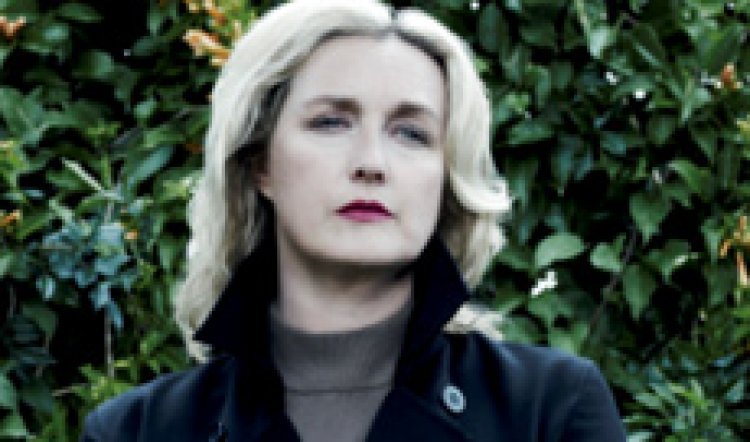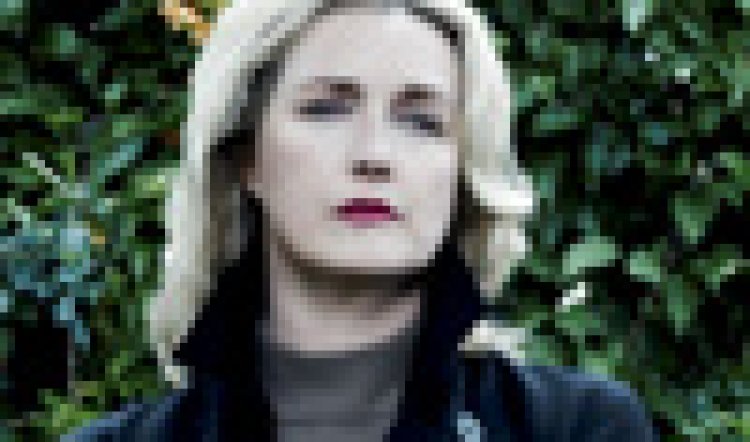
Victoria Longley
The Vertical Hour, Sydney Theatre Company at the Drama Theatre, Sydney Opera House, February 14-March 22; ph: 9250 7777 or www.sydneyoperahouse.com
Tall, handsome and self-contained, Victoria Longley is not given to actorly flamboyance and at the age of 46, is one of Australia's more interesting, more enigmatic, actresses. They are qualities that make her obvious casting for the role of Nadia Blye, former star TV war correspondent-turned Yale professor, in David Hare's latest play, The Vertical Hour.
When we talk, it's three weeks into the rehearsal period and she grins and says, "Yes, well I think we found out yesterday what we're supposed to be about. I'm just catching on."
Longley's thoughtful approach to the role and to her work has paid off with a career that has been frequently spectacular and particularly solid on the achievement side. Her TV credits include Murder Call, The Alien Years, Wildside, Water Rats, BlackJack, A Difficult Woman, Dirtwater Dynasty, Edens Lost, Farscape, Young Lions and All Saints.
On the big screen too, she has appeared in a dozen movies including Turtle Beach, Dallas Doll, Diana and Me and Crimebroker; she won the AFI Award for Best Support for Celia in 1988. She's been nominated twice more: in 1986 as Best Support for The More Things Change..., and in 1994 as Best Actress for Talk.
By her own account, however, her greatest on-stage working experience to date was as wronged wife Stevie in Edward Albee's The Goat. In a play that teetered perilously on the edge of descriptions such as appalling, intolerable, unbelievable, hilarious, farcical and pitch-black love story - with a goat as the love object - Longley was tremendous. She was unanimously voted Best Actress in the 2006 Sydney Theatre Awards and her performance is one of those indelibly imprinted on the mind.
She smiles at the memory and also at the praise heaped upon her head (none of which she read until long after the production was over). Like so many actresses in a similar position, work was hard to come by in the months that followed!
"Trite but true," she says. "I was unemployed when I won it. But how often have you heard that?"
Very recently: Toni Scanlan accepted her Best Actress award (for King Tide) in January this year having come to the awards event direct from an afternoon at Centrelink.
For Longley, the offer of The Vertical Hour was irresistible. David Hare's next play - after Stuff Happens - had its world premiere production on Broadway in 2006 with Julianne Moore in the role of the ex-TV reporter and Bill Nighy as her boyfriend's father - with whom she spends an epiphanic night of debate and something more.
Nighy enchanted New York Times critic Ben Brantley and Julianne Moore did not. Longley is vaguely aware of this but, just as she doesn't read reviews, she hasn't explored the coverage of the play in the US.
"No," she says with much deliberation. "It's difficult to avoid of course, because there's always someone who says - have you read - before you can stop them or stick your fingers in your ears. But I worked out a long time ago that reading reviews is dangerous: whether they're good or bad. The last time I read a review I was in The John Wayne Principle and someone wrote very favourably of my performance as 'a superbitch'. So of course, the next night I went on and played it like that and lost all my laughs and it was a disaster!"
[page]The title of The Vertical Hour alludes to the combat medicine term, meaning the brief window of opportunity after a catastrophic wound or injury during which a doctor can make a difference. Being a David Hare play, it also has meaning for the inner lives of the characters, particularly Nadia. Like so many pundits and professors, she is very sure of herself and her opinions, particularly when it comes to the invasion of Iraq. (She was for it, her boyfriend's father - a doctor - is against it.)
 In her personal life Longley is not a war supporter, although the last time we sat down to talk about her views her niece was about to sail for the Gulf as a sailor aboard a Royal Australian Navy ship. It meant Longley rethought her absolutist opposition to understanding her niece's independent choices and to support her in them.
In her personal life Longley is not a war supporter, although the last time we sat down to talk about her views her niece was about to sail for the Gulf as a sailor aboard a Royal Australian Navy ship. It meant Longley rethought her absolutist opposition to understanding her niece's independent choices and to support her in them.
"Nadia has a refreshing point of view - from my point of view," says Longley. "There's a lot to be said for the art of settling differences. How do we get along when we don't agree. She's insanely intelligent which I like and which is nice to play. She's not without her flaws, of course. And the twists of the play also turn her into this other creature you don't recognise. You don't often see that."
Getting her teeth into another challenging stage role is also a curious twist for Longley in real life: "You get the plums, then a whole lot of nothing," she says. "Last year I spent a lot of time as drama coach on Home and Away - if you're talking about challenging roles. People laugh and sneer at the idea of something like Home and Away having a drama coach but I watched or read something like 58 eps to bring myself up to speed before I started and I have great respect for what they do."
She looks at me quizzically, "Do you have any idea how many episodes they're working on at any one time?"
It's not a trick question: almost nobody knows unless they're involved, it seems.

"Up to 15 - shooting, rehearsing, learning - and all out of order. And the kids are young and untrained, never in their lives have they been taught how to study the text. They start off unskilled and they have no reference points. I worked out that it's my job to hear what it is the director wants and then translate it for the kids and get them to understand.
"So it's like: you're coming from here in the story and in this sequence you're going there. Find something you can relate to in your own life and use it. It's a fairy tale in the style of naturalism. And sometimes you see the light go on in their eyes - bang! And they've got it. Suddenly a kid who couldn't string a dozen words together can deliver a really heartfelt speech ..."
The light goes on in Longley's eyes: she enjoys this work. Does that mean she'd like to direct?
Immediately the shutters come down again and she smiles distantly, before saying - in a smaller voice - "Yeah ... one day when I grow up."
Meanwhile, she has the slightly unnerving prospect of her Home and Away protégés coming to see her on stage doing her thing.
It will be weird," she grins. "I really don't like knowing when friends - anyone I know - is in. It changes things and I'd rather not know. But of course, you can't really avoid it: you see people, although they don't always realise it. And you always know how it's going, even when you don't understand why!"
Is that going well or going badly?
"Both!" she laughs. "Sometimes you don't particularly like a role, but you front up anyway - especially if you have Centrelink up your arse. And - yes, you do it, as well as you can; then you realise the audience is loving it and you wonder why?"
Is she game to give an example?
She grins. "Midsummer Night's Dream. The Malcolm MacLaren music was going, it was mayhem. I was miserable and at one point I was sitting with Tim Conigrave waiting for a cue and he was miserable too and we looked out at the audience and they were loving it."
It works both ways, however, as she well knows. Sadly eminent American playwright Edward Albee missed the brilliant Sydney production of The Goat but he was curious about its reception here, having heard such good things about it, Longley recalls.
"I had lunch with him, he missed the production by about four weeks and he was asking - did they walk out? How many walked out? How did they react? (Because apparently people walked out in droves in other productions in the US.) And I said - honestly, no, they didn't. He was amazed. We had subscribers' meetings and people were curious, some were hostile.<?p>
In Melbourne some women were quite aggressive, but they'd just had Frozen there (an English play by Bryony Lavery about a child murderer) and so it might have been a bit much. But they came out to have a look and although the idea was clearly abhorrent for some, they were able to take it on and talk about it."
She is not anticipating quite such a violent reaction to The Vertical Hour even though its themes are adult and David Hare is not known to write fairy floss.
"It's visually a feast, there's subtlety and intimacy. People will enjoy this level of discussion and inference. There are delicious moment, a lot is unspoken." Another enigmatic smile: a director in waiting, surely.



